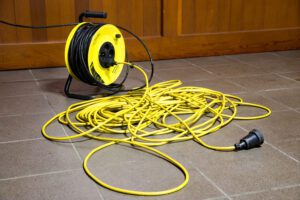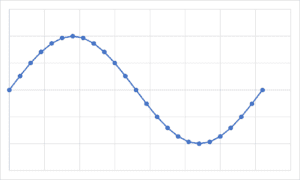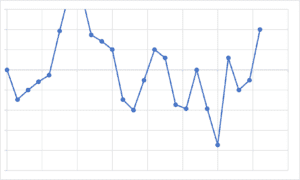The 5 Most Important Reasons You Shouldn’t Use An Extension Cord With Your Golf Cart Charger

Golf carts have become an indispensable part of many people's lives, not just for golfers but also those living in gated communities, resorts, and even some urban areas. Ensuring that the batteries are charged correctly is one of the most crucial aspects of golf cart maintenance. In previous posts, We discussed the importance of using a high-quality battery charger. However, a common mistake many golf cart owners make is using an extension cord to plug in their battery chargers. This practice can be detrimental for several reasons.
1. Voltage Drop and Inefficient Charging
When you use an extension cord, especially one that's long or of inferior quality, there is a potential for a voltage drop. Voltage Drop refers to the decrease in electrical voltage experienced as electricity travels through a wire. It is a natural occurrence due to the resistance of the wire. This means the charger might not receive the full voltage needed to charge the battery efficiently. The longer the extension cord, the more resistance the electrical current encounters.
As the current travels further, more energy is lost as heat due to this resistance, leading to a decrease in voltage by the time it reaches the end of the cord. High-quality battery chargers, like those manufactured by Lester Electrical and Delta-Q, are designed to provide optimal charging at specific voltages. A voltage drop can lead to incomplete or inefficient charging, which can reduce the lifespan of your batteries.
In this case, a voltage drop can result in inaccurate voltage readings or inefficient charging cycles. Furthermore, to compensate for the reduced voltage, some electronics might attempt to draw more current, which can stress and potentially damage their internal components. This continuous operation under reduced voltage conditions can also lead to increased energy consumption and reduced overall efficiency.
2. Potential for Electrical Interference
Electrical appliances with onboard computers don't like "dirty" power, a term often used colloquially to describe or AC input power with electromagnetic interference and/or fluctuations in voltage. High-quality chargers minimize electrical interference. However, some extension cords, especially those of lower quality, can introduce electrical noise. This can interfere with the charger's operation and affect nearby electronic devices. The term "dirty power" refers to irregularities in the electrical supply such as voltage spikes, voltage drops, or electromagnetic interference. This irregular power can also cause electronics to malfunction or not perform as intended.

Pure Sign Wave

"Dirty" Power
In an ideal scenario, alternating current (AC) power should have a pure sin waveform. However, this waveform can become distorted when interference or other disruptions are introduced. Various factors, including poor-quality extension cords, other electronic devices on the same circuit, or issues with the electrical service can cause these distortions.
Modern battery chargers contain sensitive electronics to regulate and optimize the charging process. These electronics can be affected by "dirty power." Distortions in the AC waveform can cause the charger's electronics to misread or misinterpret the incoming power, potentially leading to inefficient charging or even damage to the charger.
3. Extension Cord Overheating Risks
Extension cords can overheat, especially those not rated for the high current drawn by golf cart chargers. Overheating can damage the cord and the charger and even pose a fire risk. Lester Electrical and Delta-Q chargers are designed with safety in mind, but using them with an extension cord can negate these safety features.
4. GFCI Incompatibility
What about GFI's? Ground Fault Circuit Interrupter (GFCI) outlets are designed to protect people from electrical shock by detecting imbalances in the electrical current and quickly shutting off power. A GFCI outlet can provide an essential layer of protection against electrical shock.
If you are considering using an extension cord (which, as previously discussed, is not recommended), you should be aware that some extension cords might not be compatible with GFCI outlets. The added length and potential wear and tear on the extension cord can cause minor fluctuations in the current, leading to more frequent nuisance tripping, which happens when the GFCI detects a minor fluctuation in the current, which might be normal for some chargers, especially during the initial stages of charging or when they're performing diagnostic checks. This can result in the GFCI outlet shutting off power to the charger even when there is no actual ground fault, leading to incomplete charging cycles.
Lester Electrical and Delta-Q, industry leaders, provide guidelines on using their chargers with GFCI outlets. It is always a good idea to refer to the manufacturer's manual or website for specific recommendations and potential troubleshooting tips if you experience issues with GFCI tripping. You may also want to contact your local golf cart dealer for professional repair service or even an electrician if issues persist.
5. Warranty Concerns
Using an extension cord with your golf cart battery charger might void the warranty provided by manufacturers such as Lester Electrical and Delta-Q. If any issues arise from using an extension cord, you may bear the cost of repairs or replacements.
Final Thoughts
While using an extension cord to charge your golf cart might seem convenient, especially if your charger's cord does not reach the outlet, the risks far outweigh the benefits. Always plug your battery charger directly into a suitable and nearby outlet to ensure the longevity of your golf cart's batteries and the safety of your charging operations. Proper charging practices will ensure you get the most out of your golf cart and its batteries for years.
